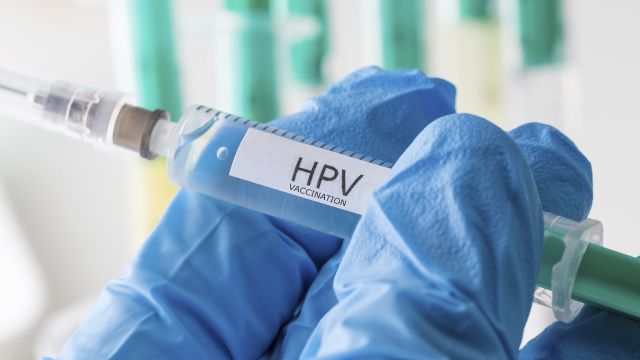Human papillomavirus (HPV), which is spread through vaginal, anal and oral sex, is the most common sexually transmitted infection in the United States. The virus is ubiquitous. So prevalent, in fact, that nearly all sexually active men and women are infected at some point during their lifetimes.
A 2013-2014 survey from the National Center for Health Statistics published in 2017 found that more than 42 percent of Americans ages 18 to 59 are infected with the virus.
It’s important to note that there are more than 40 types of HPV that can infect the genital area. These types can also infect the mouth and throat. Of these viruses, 13 can lead to certain forms of cancer, including cancers of the cervix, vagina, penis and anus as well as cancers of the head and neck. As a result, these viruses are considered high-risk strains. (Keep in mind: The HPV strains that cause skin warts around the genitals and anus typically don’t go on to cause cancer.)
Among the entire U.S. population, 23 percent of people have high-risk genital HPV, which significantly increases their risk of cancer, the government report revealed. When broken down by gender, high-risk strains of the virus infected 25.1 percent of men and 20.4 percent of women. There are also some racial and ethnic disparities. In general, the survey found that HPV rates were lower among members of the Asian population but higher among non-Hispanic African Americans.
There is a vaccine that prevents HPV infection and, in turn, the cancers caused by HPV. Vaccination among girls age 9 to 14 in wealthy nations over the previous eight to nine years has resulted in a dramatic drop in HPV infections, genital warts and precancerous cervical lesions, according to a June 2019 review published in The Lancet of 65 studies involving 60 million people. The study’s findings suggest that the HPV vaccine is so effective it could potentially provide herd immunity, reducing rates of HPV-related diseases, even among those who are not vaccinated.
In 2017, nearly half of U.S. teens were fully vaccinated against HPV, according to the Centers for Disease Control and Prevention (CDC). Unfortunately, lingering myths and misconceptions about the HPV vaccine may hinder efforts to increase vaccination rates, the American Cancer Society reports. We spoke with Gretchen Homan, MD, a pediatrician with Wesley Medical Center in Wichita, Kansas, to get the facts about the HPV vaccine.
What cancers are caused by HPV?
Basically, all cervical cancers are caused by HPV. In addition, 91 percent of anal cancers and 72 percent of oral cancers are caused by HPV. The virus has also been linked to penile, vaginal and vulvar cancers.
Why is the HPV vaccine so important?
We know these cancers are almost always caused by HPV, so if we can provide a vaccine for it, we’re basically getting rid of all these cancers.
Who should get the HPV vaccine?
It's recommended that all boys and girls receive the two-dose vaccine between the ages of 9 and 12, with the first dose coming at age 9 or 10. Women and men who have not previously been vaccinated can also receive the vaccine up to age 26, but it’s worth noting that being vaccinated at older ages is less effective for lowering cancer risk. In special circumstances, a healthcare provider may recommend receiving the vaccine up until age 45.
Keep in mind that anyone immunized at age 15 or older needs three doses of the vaccine.
What does age have to do with the vaccination?
The vaccine is more effective if we give it earlier when the immune response in the body is stronger. Some evidence also suggests that the earlier the two-dose series is started, the likelier the patient is to receive the second dose.
Are there different types of HPV vaccines?
All three HPV vaccines—Gardasil 9, Gardasil and Cervarix—are considered safe by the CDC. Only Gardasil 9 is now used in the U.S., however, as it protects against additional strains of HPV and provides broader coverage.
How safe is the vaccine?
Only a small fraction of the millions of people who’ve received the HPV vaccine experience any problems. The most common adverse effect is a local reaction, such as pain or redness at the site of the injection. Some patients may feel lightheaded, so we make sure they’ve had something to eat before receiving the vaccine and that they rest afterwards.
How long does the vaccine protection last?
At this point, there are no recommendations for booster doses of the vaccine for those who received the two-dose vaccine by age 12 or older teens and adults who complete the three-dose series.
Are there any other ways to prevent HPV?
Aside from being fully vaccinated, the only way to prevent HPV would be to never have sexual contact.






